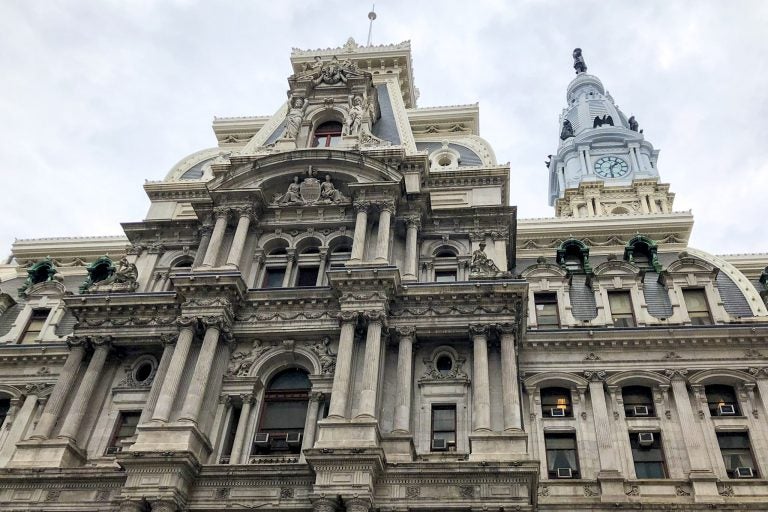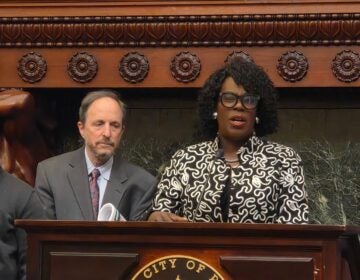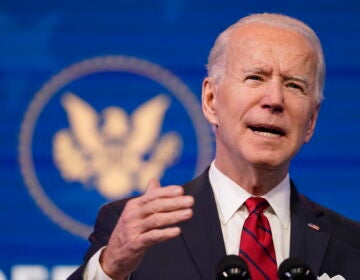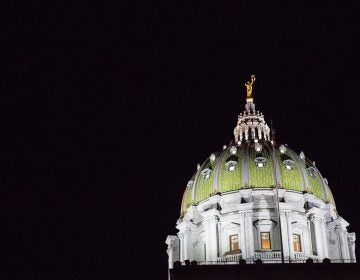Philadelphia’s budget team is strategizing for the next recession
Municipal budgets are healthier than they were a decade ago. Still, departments have been asked to prepare proposals for a variety of scenarios.

Philadelphia City Hall. (Danya Henninger/Billy Penn)
Updated: 4 p.m.
—
Philadelphia’s government is preparing for a recession in the next year. Municipal balance sheets are healthier than they were before the last recession a decade ago, but officials warn that the city isn’t as well prepared as its peers.
Budget director Marisa Waxman said city departments have already been asked to prepare cutback proposals based on a variety of recessionary scenarios.
“This isn’t a five years’ away concern, it’s a much narrower time horizon,” said Waxman, “which is why we are taking this so seriously, basically, immediately.”
In Philadelphia’s annual financial report, released Monday morning, the budget office revealed that the city ended fiscal year 2019 with a fund balance of $439 million in the black, which represents about 9% (or 33 days) of spending.
That’s better than where Philadelphia stood before the last recession but substantially worse than the Government Finance Officers Association’s recommendation of 17% for a healthy fund balance.
“Philadelphia’s finances remain weak compared to best practices and peer cities,” a press release from the Budget Office reads. To meet the recommended fund levels, the city would have needed to end this fiscal year with a positive fund balance of $821.5 million.
Mayor Jim Kenney’s administration says the city has been preparing for a recession in a variety of additional ways. That includes paying $34.1 million into a rainy-day fund, setting aside money for future labor contracts, and reserving $50 million annually over the 2020-2024 period to hedge against potential reductions in federal spending.
The city has already been planning for slowing economic growth, said finance director Rob Dubow, marking another contrast to the Great Recession. In the last two years, the city used $50 million in operating expenses as “pay as you go” financing for a variety of capital projects instead of taking out loans, which would have cost more in the long term. (The $20 million for voting machines got spent this way, as did $22.5 million for Streets and Fire Department vehicles.)
“Economists have seen this recession coming more than they saw that one coming, so it’s allowed us in our five-year plan to have projections showing slowing growth,” said Dubow. There also wasn’t a rainy-day fund of any size during the last recession.
That economic decline, which lasted in the U.S. between December 2007 and June 2009, wracked Philadelphia’s finances. Dubow said it was only last year that the city’s fund balance recovered to where it was pre-2008.
Municipal services still haven’t fully recovered to pre-2008 levels. There are 900 fewer city workers covered by the general fund than there were at the end of fiscal year 2008. In fiscal year 2007, the Streets Department paved 107 miles of roads. The city is only just now getting back to a similar paving rate, with 101 miles of roadway projected to be paved by the end of fiscal year 2020.
Some outside observers said that Philadelphia is on the right track, although they added that city leaders should push more resources into a larger fund balance and a larger rainy day fund over the coming year.
Unlike the downturn that occurred in 2007-2009, “the recession everyone is talking about now will not be financially driven, but demand driven. Financial crises take a lot longer to work out,” said Robert P. Inman, a professor of finance, economics, and public policy at the Wharton School of the University of Pennsylvania. “Those recessions are easier to turn around if the central bank does what it can do and the national government spends money, it lasts 12 to 18 months, so you need a cushion that’s good for two years basically.”
City officials said there is no precise plan yet about how to cut services or increase taxes in the face of declining revenues.
In response to the Great Recession, then-Mayor Michael Nutter hiked property taxes. City officials would not say whether property tax increases would be considered again the event of a downturn.
Inman said Nutter was right to focus on property tax increases.
Neither Inman nor city officials are anticipating an economic downturn as devastating this time around. But Waxman and Dubow warn that many of the scenarios they’ve already gamed out could look pretty bleak. If growth is half what is currently projected, the city would need to find new revenue or cut services worth $263 million.
“In less mild scenarios like no growth at all, over five years a billion in revenue loss is possible,” said Waxman. “If we see a decline in revenues, even for just two years, that could lead to a $1.9 billion loss over a five-year plan. And this could happen fairly quickly. In all but the most mild scenario, by fiscal year 2022 [we] could see our fund balance go negative.”
A recent survey of the National Association for Business Economics found that 74% of economists anticipate a recession by 2021, while the news website Axios reports that close to two in three finance officers of large cities tell the National League of Cities that they are predicting a recession in 2020.
—
Editor’s note: This article was updated to add details from the city finance office and a comment from the Wharton School’s Robert P. Inman.
WHYY is your source for fact-based, in-depth journalism and information. As a nonprofit organization, we rely on financial support from readers like you. Please give today.







